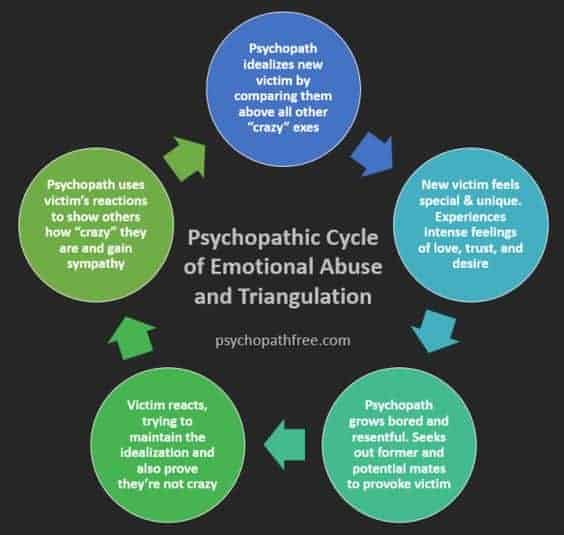Closure in a relationship with a narcissist is challenging regardless of whether we decide to finally go no-contact with them, or they leave abruptly (which is always the way they leave if they decide to do so).
There are multiple ways that a “break-up” with a narcissist may occur.
A partner may cut off contact completely without letting the narcissist know that he or she is doing so out of concerns for safety or to avoid narcissistic rage or intense attempts getting the partner to stay that it might cause (or even some combination of all three).
The narcissist may also cut off contact without a word once securing a new source of primary narcissistic supply, after the original partner has fallen off the pedestal.
This may happen if partner has begun to see through the cracks in the narcissist’s facade. The narcissist then realizes that the partner has seen these cracks and therefore sees the partner is flawed (hence, both are no longer “idealized”), and the narcissist seeks someone new to start over with.
Breakups can also occur if the narcissist seeks revenge after a narcissistic injury and discards the partner in a humiliating or cruel manner.
Sometimes, during a breakup, a narcissist may even give a faux sort of “closure” that feels open-ended and leaves many unanswered questions and no real resolution. Yet it is the same mismatching and deflection that happens throughout the rest of the relationship where words don’t match actions.
For example, it is common for narcissists to take up other partners within days of leaving a primary partner. They may then return to the original primary and vacillate between them.
If the narcissist or partner decides to break up the relationship but the partner seeks answers about narcissist’s ability to move on so quickly, the narcissist may respond with answers, yet they feel nonsensical answers or don’t add up. You feel they are trying to provide closure, but there is a lingering feeling of dissatisfaction. This is not closure.
What on earth is going on?
Narcissists cannot provide closure for many of the same reasons that they cannot engage in constructive conversations with us.
I am of the opinion, however, that with closure, the reasons can be even more complex because, in addition to the same things they might be seeking from normal conversations with us, there are additional reasons why they don’t give us closure.
Closure, as what we think of as a final conversation, has a symbolic meaning that gives a narcissist many more ways to both potentially manipulate, remain in control, and also, to render him or her powerless if we handle it properly.
So let’s pick apart reasons why closure with a narcissist is not possible.
Seven Reasons Why We Should Give Up Trying to Get Closure With a Narcissist
The reasons why they don’t provide closure in the short-term can depend upon who is doing the breaking up, however, in the long-run, they work out to be the same. If they are angry at you, they don’t want to give you the satisfaction of providing you with closure because they don’t feel
1. They can only care about how they feel and can’t put themselves in our shoes.
Whatever is causing them to leave or you to leave, they don’t care if we have closure or not.
Narcissists and their partners have always had different narratives of the relationship and that’s no different at the end. We’re attached to the relationship; they’re not. They have been attached to the way we make them feel.
If they’re angry that the relationship is ending, they will only be concerned with the fact that they’re losing a source of narcissistic supply, not the demise of the relationship itself.
If they are leaving for some reason related to their own lives, they already have new things going on in their lives. Either way, our “closure” is a concept that isn’t even on their radar because the relationship itself is one that was always designed to serve their interests.
They didn’t care enough to stop hurting us, why should they care enough to provide us with closure? Closure is for people who are attached to others and need to “disengage” themselves from the lives of others when relationships are coming to an end.
2. Not providing you with closure makes it harder for you to go and stay no-contact.
To us, by definition, “closure” means relationships are ending. To narcissists, exes are fair game forever. Closure means whatever they want it to mean at the time a relationships ends.
Leaving without what we consider to be closure (whether on bad terms or not) leaves open the possibility that they can manipulate their way back into our lives because they realize that there will be “unfinished business.” It sets the stage for a hoover to take place at a later time.
Whether they fall silent or their answers are unsatisfactory, if they know you are unsatisfied with the way things ended, there is “unfinished business” that they can capitalize on. They may promise to answer questions at a later time. They may intentionally say they want to continue a conversation later or that they will think about our questions because they want to give us serious answers.
What they want is not to answer at all.
3. They can’t or won’t answer your questions satisfactorily in a way that makes any sense.
Many times, part of closure involves trying to understand why the relationship unfolded the way it did and we attempt to seek answers from the narcissist.
If you claimed to love me so much, why did you hurt me like that? If you wanted to be with that person, why can’t you just leave me alone? What is really going on? What is it you’re really trying to accomplish?
In truth, there are no answers they could provide to us that we could accept until we are ready to accept that our partner did not view our relationship the same way that we did and never had the same goals. They don’t enter any of their relationships with the same goals as any of their partners.
The questions we want to know the answers to come from the place of someone who can’t understand why someone who loves and is attached to someone else would do the things that the narcissist has done.
However, once we come to understand that the narcissist did not come from the same place– that is, does not view the world as we do–we can realize it is pointless to ask these questions of the narcissist, because the narcissist cannot provide answers to questions that do not pertain to a narcissist’s point of view.
What kind of answers are we likely to get? Answers that don’t match with the actions that we see. Vague answers. “I don’t know.” Answers that blame others. Excuses, such as blaming actions on alcohol or youth or stress or something that happened to the narcissist in the past. “Because I felt like it at the time.”
Yet it never adds up, because the sum total of any answers they provide never add up to a coherent picture of someone who regrets what they did, took actions to stop it
Narcissists act in their own self-interest. This is the answer to the majority of our questions that we seek during closure. Self-aware narcissists know that they do this but they won’t tell you that this is why they did what they did. Narcissists who are not self-aware do not know
That understanding will likely require a lot of reading about narcissistic abuse and perhaps talking to others who have experienced the same type of relationship. It may require an extended period of time away from the relationship.
Yet, ironically, once we do come to accept this, we will no longer require answers from the narcissist.
4. Not providing closure is a form of punishment.
If the breakup is a negative one, whether you are leaving them or they are leaving you, denying you anything you need to make the breakup go smoothly is one way for them to either get revenge or to try to demonstrate your unimportance.
If you are the one leaving them, they may try at first a multitude of things to get you to stay, however, ultimately, if they do not work, their demeanor will likely turn to rage at their loss of control over you.
If they are the ones leaving, they may want to send the message that you are unimportant and they don’t owe you any answers. Either way, they may want to send the message that you don’t deserve closure.
5. They get narcissistic supply out of believing that you’re still thinking about them.
Again, it doesn’t matter who left first or how the breakup occurred. As long as it was abrupt and didn’t provide you with the satisfaction that you needed, they will gain satisfaction knowing that you’re left with questions and a lack of understanding of why the relationship unfolded as it did or ended as it did.
If they ended things out of anger or there was a painful discard, they will gain narcissistic supply out of knowing that you are suffering. Their narcissistic supply may come from knowing you have to maintain vigilance and gain your own closure without them (which still means thinking about them) even if you were the one to end things.
If they believe you are not moving on, even if, by working on gaining your own closure you are moving on, this is satisfying to their egos.
6. If they have been running a smear campaign, it may fit with the narrative they’ve already been telling everyone else.
If they have been setting up a breakup for a while, which can happen when they have stopped idealizing you and have your replacement ready, they can use your need for closure as part of that narrative, even though it’s perfectly rational.
For example, once a narcissist begins to see the flaws of the current partner and devalues him or her and seeks out others (or the current partner learns of the others the narcissist has kept in the wings all along), the current partner, who has no idea what is happening, reacts to the narcissist’s blatant cheating.
The narcissist sets the stage to leave the current partner for one of the others by using the partner’s reactions to play the victim so that when he or she leaves, it is seen as the rational thing to do and not surprising.

As the narcissist makes an exit, the bewildered partner may contact the narcissist asking questions and wanting to know what happened. The more the narcissist refuses to provide it, the more the partner reacts. Then the narcissist can sit back and use the partner’s reactions to fake a new reality based on half-truths.
The narcissist has first deceived the partner and is now deceiving everyone else.
7. In every scenario except one, they have their “closure.”
Narcissists have a different idea of what closure means: control.
Throughout the relationship, they have sought control and they seek to maintain it when the relationship ends as well. They will do everything in their power to maintain it.
That control is control over you and consists of one or more of the following: control over how you feel, control over your lack of knowledge about their own goals and motivations, and control over their ability to come and go as they please.
By not giving you what they know is your definition of closure, they maintain these things and their own definition of closure.
Except in one case and one case only.
And that is if we choose to go no-contact with them.






32 Comments
Lily
This honestly couldn’t be more true for me. My first love (I now see as a narcissist) “rescued” me from trauma (there was some definite trauma bonding between the 2 of us) and I became extremely attached. Now that I think of it he sought me out to get back at an ex of his who cheated on him.
Even though it’s wrong, I still think of our relationship as the only time I felt happy in my life. And that was 17 years ago. He made me feel special and so so loved.
He broke up with me and went totally no contact. I tried to get answers from him. He ignored me. He had found someone new (from his past) and gotten together with this person immediately after he broke things off with me. (I’m sure they were talking before he officially broke up with me — he was laying the groundwork).
Him cutting me off made me extremely insecure and panicked (due to my anxious attachment style and trauma) and he called me “crazy” to everyone around. That was the narrative he built to make himself look and feel better about what he did to me.
He never apologized, he never acknowledged anything wrong.
But it’s been 17 years and I still think about him every single day. I still think of him as my one and only true love.
I don’t even want to live anymore because I can’t stop thinking about how happy I was for our short relationship and how I will never know that happiness ever again.
He’s married now and I tried to see if he would have a conversation with me so I can finally get some closure. He responded for a while but stopped recently responding and I’m a wreck.
😭
Jody
I’m so sorry, I can relate. I’m going thru the same thing, he totally ghosted me, blocked me and changed his number after I moved four states away for us to be together. No closure is mind boggling, you’ll always ask “why”. He was with a married woman when I finally got moved, never even got to see him. I’m actually lucky she spared me more funacial and verbal abuse, she took the physical abuse and continued to stay with him, he’s wanted on eight warrants and she refuses to call the police; he now has left her in another state to go on to his next victim he had in the shadows. Hes a criminal and is as close to saran as you can get.